 W
WThe Joint Chiefs of Staff (JCS) is the body of the most senior uniformed leaders within the United States Department of Defense, which advises the president of the United States, the secretary of defense, the Homeland Security Council and the National Security Council on military matters. The composition of the Joint Chiefs of Staff is defined by statute and consists of a chairman (CJCS), a vice chairman (VJCS), the service chiefs of the Army, Marine Corps, Navy, Air Force, Space Force, and the chief of the National Guard Bureau. Each of the individual service chiefs, outside their JCS obligations, work directly under the secretaries of their respective military departments, e.g. the secretary of the Army, the secretary of the Navy, and the secretary of the Air Force.
 W
WThe director of the Joint Staff (DJS) is a three-star officer who assists the Joint Chiefs of Staff, a cabinet of senior military officers within the United States Armed Forces who advise the secretary of defense and the president on military matters. The director assists the chairman of the Joint Chiefs of Staff in managing the Joint Staff and with the management and organization of the staff's members. The director also chairs meetings of the Operations Deputies, a subsidiary body comprising the director and a three-star delegate from each service who preview or resolve issues before they are escalated to the four-star level of the Joint Chiefs of Staff.
 W
WSenior Enlisted Advisor to the Chairman of the Joint Chiefs of Staff (SEAC) is a military position within the United States Department of Defense and is the most senior Non Commissioned Officer (NCO) overall in the United States Armed Forces. The SEAC is appointed by the Chairman of the Joint Chiefs of Staff to serve as a spokesperson to address the issues of enlisted personnel to the highest positions in the Department of Defense. As such, the SEAC is the senior enlisted advisor to the Chairman of the Joint Chiefs of Staff, and serves at the pleasure of the Secretary of Defense. The SEAC's exact duties vary, depending on the Chairman, though he generally devotes much time traveling throughout the Department of Defense observing training and communicating to service members and their families. The normal tour of assignment is four years, which runs concurrently with the Chairman. The first member to hold this post was William Gainey. The current SEAC is Ramón Colón-López, USAF; he assumed the duties on December 13, 2019.
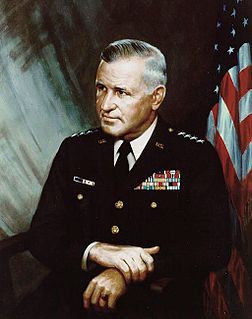 W
WCreighton Williams Abrams Jr. was a United States Army general who commanded military operations in the Vietnam War from 1968 to 1972, which saw United States troop strength in South Vietnam reduced from a peak of 543,000 to 49,000. He was then Chief of Staff of the United States Army from 1972 until his death.
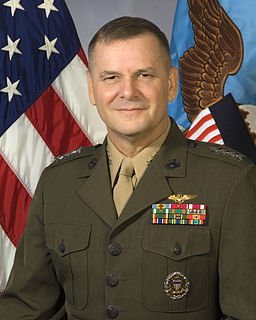 W
WJames Edward "Hoss" Cartwright is a retired United States Marine Corps four-star general who last served as the eighth Vice Chairman of the Joint Chiefs of Staff from August 31, 2007, to August 3, 2011. He previously served as the Commander, U.S. Strategic Command, from September 1, 2004, to August 10, 2007, and as Acting Commander, U.S. Strategic Command from July 9, 2004, to September 1, 2004. He retired from the Marine Corps on August 3, 2011, after nearly 40 years of service.
 W
WGeorge William Casey Jr. is a retired four-star general who served as the 36th Chief of Staff of the United States Army from April 10, 2007, to April 10, 2011. Casey served as Commanding General, Multi-National Force – Iraq, from June 2004 to February 8, 2007, and was in the army for his entire adult working life. He now resides in Arlington, Virginia.
 W
WThe chairman of the Joint Chiefs of Staff (CJCS) is the highest-ranking and most senior military officer in the United States Armed Forces and is the principal military advisor to the president, the National Security Council, the Homeland Security Council, and the secretary of defense. While the chairman of the Joint Chiefs of Staff outranks all other commissioned officers, the chairman is prohibited by law from having operational command authority over the armed forces; however, the chairman does assist the president and the secretary of defense in exercising their command functions.
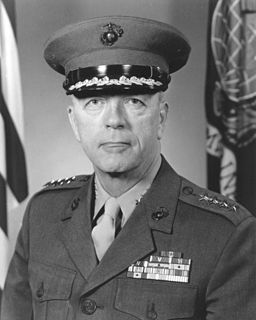 W
WLeonard Fielding Chapman Jr. was a United States Marine Corps general who served as the 24th Commandant of the Marine Corps from 1968 to 1972. He was a World War II combat veteran, decorated for his actions in the Battle of Peleliu and the Battle of Okinawa. He retired from the Marine Corps after 37 years of service. In retirement, he served as the Commissioner of the Immigration and Naturalization Service.
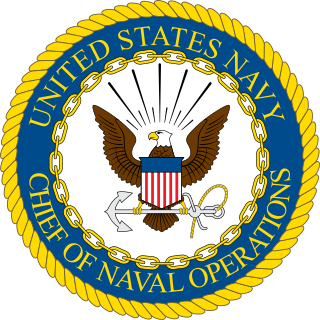 W
WThe chief of naval operations (CNO) is the professional head of the United States Navy. The position is a statutory office held by an admiral who is a military adviser and deputy to the secretary of the Navy. In a separate capacity as a member of the Joint Chiefs of Staff, the CNO is a military adviser to the National Security Council, the Homeland Security Council, the secretary of defense, and the president. The current chief of naval operations is Admiral Michael M. Gilday.
 W
WThe chief of staff of the Army (CSA) is the service chief of the United States Army. As the highest ranking officer assigned to serve in the Department of the Army, the chief is the principal military advisor and a deputy to the secretary of the Army. In a separate capacity, the CSA is a member of the Joint Chiefs of Staff and, thereby, a military advisor to the National Security Council, the secretary of defense, and the president of the United States. The CSA is typically the highest-ranking officer on active-duty in the U.S. Army unless the chairman or the vice chairman of the Joint Chiefs of Staff are Army officers.
 W
WThe chief of the National Guard Bureau (CNGB) is the highest-ranking officer of the United States National Guard and the head of the National Guard Bureau. The position is a statutory office, held by a federally recognized commissioned officer who has served at least 10 years of federally recognized active duty in the National Guard; the Army National Guard or the Air National Guard. In a separate capacity as a member of the Joint Chiefs of Staff, the chief is a military adviser to the National Security Council, the Homeland Security Council, the secretary of defense, and the president on matters pertaining to the National Guard.
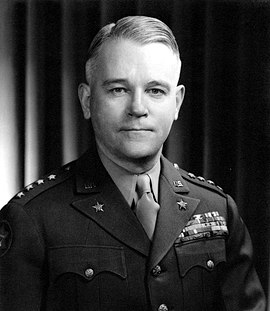 W
WGeneral Joseph Lawton Collins was a senior United States Army officer. During World War II, he served in both the Pacific and European Theaters of Operations, one of a few senior American commanders to do so. He was Chief of Staff of the United States Army during the Korean War.
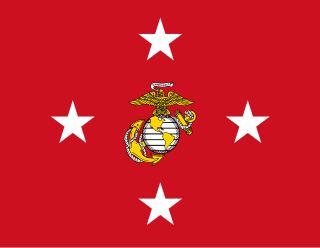 W
WThe commandant of the Marine Corps (CMC) is normally the highest-ranking officer in the United States Marine Corps and is a member of the Joint Chiefs of Staff. The CMC reports directly to the secretary of the Navy and is responsible for ensuring the organization, policy, plans, and programs for the Marine Corps as well as advising the president, the secretary of defense, the National Security Council, the Homeland Security Council, and the secretary of the Navy on matters involving the Marine Corps. Under the authority of the secretary of the Navy, the CMC designates Marine personnel and resources to the commanders of Unified Combatant Commands. The commandant performs all other functions prescribed in Section 5043 in Title 10 of the United States Code or delegates those duties and responsibilities to other officers in his administration in his name. As with the other joint chiefs, the commandant is an administrative position and has no operational command authority over United States Marine Corps forces.
 W
WJames Terry Conway is a retired United States Marine Corps general who served as the 34th Commandant of the Marine Corps. Among his previous postings were Director of Operations (J-3) on the Joint Chiefs of Staff, Commanding General of 1st Marine Division and I Marine Expeditionary Force, taking part in the 2003 invasion of Iraq and the First Battle of Fallujah.
 W
WVice Admiral Robert Thomas Conway, Jr., is a retired officer in the United States Navy, who retired from active service on 1 April 2009. His last assignment was commander of Navy Installations Command, Washington D.C., where he led a startup organization of 18 navy admirals and senior executives, 60,000 military staff, government employees and contractors, in the management of 80 navy bases worldwide.
 W
WWilliam James Crowe Jr. was a United States Navy admiral who served as Chairman of the Joint Chiefs of Staff under Presidents Ronald Reagan and George H. W. Bush, and as the ambassador to the United Kingdom under President Bill Clinton.
 W
WEdmund P. Giambastiani Jr. is a retired United States Navy admiral who served as the seventh Vice Chairman of the Joint Chiefs of Staff from 2005 to 2007. He retired in 2007, after 37 years of service.
 W
WMichael William Hagee is a retired United States Marine Corps general who served as the 33rd Commandant of the Marine Corps from 2003 to 2006, succeeding General James L. Jones on January 13, 2003. He stepped down as Commandant two months before the end of his four-year term, and was succeeded by General James T. Conway on November 13, 2006. On that date, Hagee had his retirement ceremony just prior to the passage of command ceremony. Hagee retired from the Marine Corps on January 1, 2007.
 W
WRobert Tralles Herres was a United States Air Force officer who served as the first Vice Chairman of the Joint Chiefs of Staff.
 W
WJames Lemuel Holloway III was a United States Navy admiral and naval aviator who was decorated for his actions during World War II, the Korean War, and the Vietnam War. After the Vietnam War, he was posted to The Pentagon, where he established the Navy's Nuclear Powered Carrier Program. He served as Chief of Naval Operations from 1974 until 1978. After retiring from the Navy, Holloway served as President of the Naval Historical Foundation from 1980–1998 and served another ten years as its chairman until his retirement in 2008 when he became chairman emeritus. He was the author of Aircraft Carriers at War: A Personal Retrospective of Korea, Vietnam, and the Soviet Confrontation published in 2007 by the Naval Institute Press.
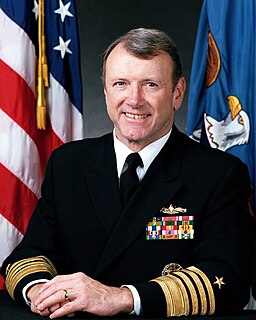 W
WDavid Elmer Jeremiah was a United States Navy admiral who served as Vice Chairman and also acting Chairman of the Joint Chiefs of Staff. After his retirement from the Navy in February 1994, he worked in the field of investment banking. He served as partner and President, CEO and later Chairman of Technology Strategies & Alliances Corporation, a strategic advisory and investment banking firm engaged primarily in the aerospace, defense, telecommunications, and electronics industries. During his military career Jeremiah earned a reputation as an authority on strategic planning, financial management and the policy implications of advanced technology.
 W
WThe Joint Deployable Analysis Team (JDAT) is part of the J6 Directorate of the Joint Chiefs of Staff.
 W
WDavid Charles Jones was a United States Air Force general and the ninth Chairman of the Joint Chiefs of Staff. In this capacity, General Jones served as the highest ranking uniformed officer of the United States military forces. Prior to serving as Chairman of The Joint Chiefs of Staff, Jones served as the ninth Chief of Staff of The United States Air Force and fifteenth Commander of The United States Air Force in Europe.
 W
WJames Logan Jones Jr. is a retired United States Marine Corps general who served as the 22nd United States National Security Advisor from 2009 to 2010. During his military career, he served as the 32nd Commandant of the Marine Corps from July 1999 to January 2003, and Commander, United States European Command and Supreme Allied Commander Europe from 2003 to 2006. Jones retired from the Marine Corps on February 1, 2007, after 40 years of service.
 W
WCurtis Emerson LeMay was an American Air Force general who implemented an effective but controversial strategic bombing campaign in the Pacific theater of World War II. He later served as Chief of Staff of the U.S. Air Force from 1961 to 1965.
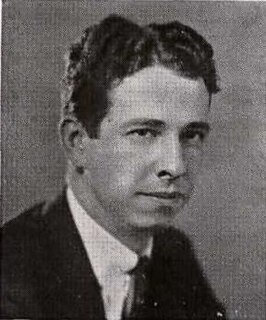 W
WEdward Paul Lilly was an American historian, author, educator, and government worker who specialized in the history of political and psychological warfare in the twentieth century.
 W
WGeneral John Paul McConnell was the sixth Chief of Staff of the United States Air Force. As chief of staff, McConnell served in a dual capacity. He was a member of the Joint Chiefs of Staff which, as a body, acts as the principal military adviser to the President of the United States, the National Security Council, and the Secretary of Defense. In his other capacity, he was responsible to the Secretary of the Air Force for managing the vast human and materiel resources of the world's most powerful aerospace force.
 W
WMerrill Anthony "Tony" McPeak is a retired 4-star general in the United States Air Force whose final assignment before retirement was as the 14th Chief of Staff of the Air Force from 1990 to 1994.
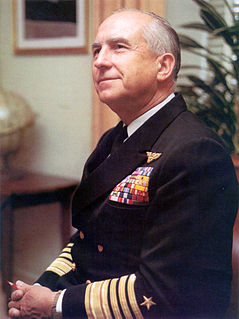 W
WThomas Hinman Moorer was an admiral and naval aviator in the United States Navy who served as Chief of Naval Operations from 1967 to 1970, and as the Chairman of the Joint Chiefs of Staff from 1970 to 1974.
 W
WTeed Michael "Buzz" Moseley is a retired United States Air Force general who served as the 18th Chief of Staff of the United States Air Force. He is a fighter pilot with more than 3,000 flight hours in fighters and trainers, most in the F-15 Eagle.
 W
WRichard Bowman Myers is the 14th president of Kansas State University and a retired four-star general in the United States Air Force who served as the 15th Chairman of the Joint Chiefs of Staff. As Chairman, Myers was the highest ranking uniformed officer of the United States military forces.
 W
WLieutenant General Gregory S. Newbold is a retired United States Marine Corps 3-star general who served as Director of Operations (J-3) for the Joint Chiefs of Staff from October 2000 until he retired in October 2002. Openly critical of Donald Rumsfeld's plans for the invasion of Iraq, he retired partly as a protest.
 W
WWilliam A. Owens is a retired admiral of the United States Navy and who served as Vice Chairman of the Joint Chiefs of Staff from 1994 to 1996. Since leaving the military in 1996, he served as an executive or as a member of the board of directors of various companies, including Nortel Networks Corporation.
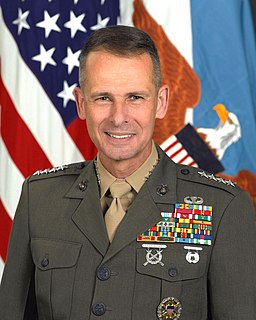 W
WPeter Pace is a retired United States Marine Corps general who served as the 16th Chairman of the Joint Chiefs of Staff. Pace was the first Marine officer appointed as chairman, and the first Marine officer to be appointed to three different four-star assignments; the others as the 6th Vice Chairman of the Joint Chiefs of Staff from October 1, 2001, to August 12, 2005, and as Commander-in-Chief, U.S. Southern Command from September 8, 2000, to September 30, 2001. Appointed chairman by President George W. Bush, Pace succeeded U.S. Air Force General Richard Myers on September 30, 2005.
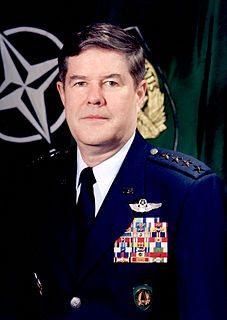 W
WGeneral Joseph W. Ralston is currently the United States Special Envoy for Countering the Kurdistan Workers Party (PKK) and holds senior positions in various defense related corporations. He was previously a career officer in the United States Air Force, and served as the Vice Chairman of the Joint Chiefs of Staff (1996–2000) as well as Supreme Allied Commander for the North Atlantic Treaty Organization (NATO) in Europe (2000–2003).
 W
WGary Roughead is a former United States Navy officer who served as the 29th Chief of Naval Operations from September 29, 2007 to September 22, 2011. He previously served as Commander, United States Fleet Forces Command, from May 17 to September 29, 2007. Prior to that, Roughead served as the 31st Commander, United States Pacific Fleet from July 8, 2005, to May 8, 2007. He retired from the U.S. Navy after 38 years of service.
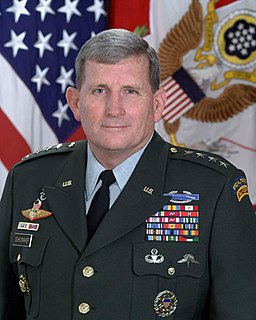 W
WPeter Jan Schoomaker is a retired four-star general of the United States Army who served as the 35th Chief of Staff of the United States Army from August 1, 2003 to April 10, 2007. Schoomaker's appointment as Chief of Staff was unusual in that he was recalled and came out from retirement to assume the position. Schoomaker voluntarily retired from the Army for the second time in 2007 after completing the full four-year term as Chief of Staff.
 W
WJohn Malchase David Shalikashvili was a United States Army general who served as Supreme Allied Commander Europe from 1992 to 1993 and Chairman of the Joint Chiefs of Staff from 1993 to 1997. He was born in Warsaw, Poland, in the family of émigré Georgian officer Dimitri Shalikashvili and his Polish wife Maria Rüdiger-Belyaeva. In 1996, he was the first recipient of the Naval War College Distinguished Graduate Leadership Award.
 W
WHenry Hugh Shelton is a former United States Army officer who served as Chairman of the Joint Chiefs of Staff from 1997 to 2001.
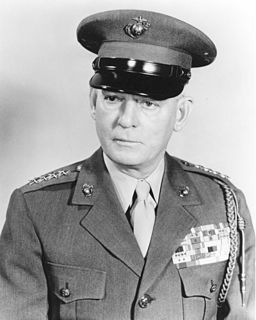 W
WLemuel Cornick Shepherd Jr. was a four-star general of the United States Marine Corps. A veteran of World War I, World War II, and the Korean War, he was the 20th Commandant of the Marine Corps. As Commandant, he secured a place on the Joint Chiefs of Staff, gaining parity for the Marine Corps with the other military services.
 W
WMaxwell Davenport Taylor was a senior United States Army officer and diplomat of the mid-20th century. He served with distinction in World War II, most notably as commander of the 101st Airborne Division, nicknamed "The Screaming Eagles."
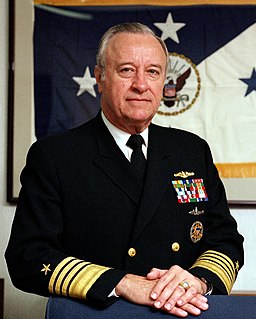 W
WCarlisle Albert Herman Trost was a United States Navy officer who served as the 23rd Chief of Naval Operations (CNO) and a member of the Joint Chiefs of Staff from July 1, 1986 to June 29, 1990. He oversaw the Navy during the end of the Cold War, and the preparations for the Gulf War of 1991. He retired from active naval service on July 1, 1990, following completion of a four-year term as CNO.
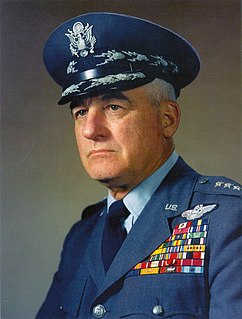 W
WNathan Farragut Twining was a United States Air Force general, born in Monroe, Wisconsin. He was Chief of Staff of the United States Air Force from 1953 until 1957, and Chairman of the Joint Chiefs of Staff from 1957 to 1960. He was the first member of the Air Force to serve as Chairman. Twining was a distinguished "mustang" officer, rising from private to four-star general and appointment to the highest post in the United States Armed Forces in the course of his 45-year career.
 W
WThe chief of space operations (CSO) is a statutory office held by a general in the United States Space Force, and is the principal military adviser to the secretary of the Air Force for Space Force operations; and is in a separate capacity a member of the Joint Chiefs of Staff, and thereby a military adviser to the National Security Council, the secretary of defense, and the president. The chief of space operations is typically the highest-ranking officer on active duty in the Space Force unless the chairman or the vice chairman of the Joint Chiefs of Staff are Space Force officers.
 W
WThe chief of staff of the Air Force is a statutory office held by a general in the United States Air Force, and as such is the principal military advisor to the secretary of the Air Force on matter pertaining to the Air Force; and is in a separate capacity, a member of the Joint Chiefs of Staff, and thereby a military adviser to the National Security Council, the secretary of defense, and the President. The chief of staff is typically the highest-ranking officer on active duty in the Air Force unless the chairman and/or the vice chairman of the Joint Chiefs of Staff are Air Force officers.
 W
WHoyt Sanford Vandenberg was a United States Air Force general. He served as the second Chief of Staff of the Air Force, and the second Director of Central Intelligence.
 W
WJohn William "Jack" Vessey Jr. was a career officer in the United States Army. He attained the rank of general, and is most notable for his service as the tenth Chairman of the Joint Chiefs of Staff.
 W
WThe vice chairman of the Joint Chiefs of Staff (VJCS) is, by U.S. law, the second highest-ranking military officer in the United States Armed Forces, ranking just below the chairman of the Joint Chiefs of Staff. The vice chairman outranks all respective heads of each service branch, with the exception of the chairman, but does not have operational command authority over their service branches. The Goldwater–Nichols Act of 1986 created the position of vice chairman to assist the chairman in exercising his or her duties. In the absence of the chairman, the vice chairman presides over the meetings of the Joint Chiefs of Staff and performs all other duties prescribed under 10 U.S.C. § 153 and may also perform other duties that the president, the chairman, or the secretary of defense prescribes.
 W
WThe vice chief of the National Guard Bureau (VCNGB) is the second highest-ranking officer of the National Guard Bureau, which is a joint activity of the United States Department of Defense. The vice chief is also the second in charge of the United States National Guard; which is a joint reserve component of the United States Army and the United States Air Force. The vice chief serves as the principal advisor to the chief of the National Guard Bureau and the secretary of defense, through the chairman of the Joint Chiefs of Staff, on matters involving non-federalized National Guard forces and on other matters as determined by the United States Secretary of Defense. The vice chief also serves as the principal adviser to the secretary of the Army, the secretary of the Air Force, the chief of staff of the Army, and the chief of staff of the Air Force, on matters relating to federalized forces of the United States National Guard and its sub-components; the Army National Guard, and the Air National Guard.
 W
WEdward F. Welch Jr. was a rear admiral of the United States Navy active during much of the Cold War. His career included service as a submarine officer, positions related to nuclear warfare planning, arms control, and North Atlantic Treaty Organization affairs, and a tour as president of the Naval War College.
 W
WGeneral Thomas Dresser White was the fourth Chief of Staff of the United States Air Force.